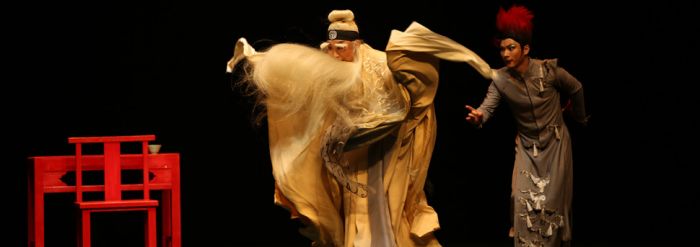Peking Opera tackles Faust

A Chinese production of Faust starring Liu Dake as the lead and Wang Lu as Mephisto
A Peking Opera performance based on Goethe’s masterpiece Faust has finished its third round of shows in Beijing. An experiment in rendering Western classics with Chinese art, it is the fruit of joint efforts by artists from China, Italy and Germany.
The play, co-produced by the China National Peking Opera Company and the Italian Emilia Romagna Theatre Foundation, was performed at the Mei Lanfang Theater.
Taking the form of Peking Opera, the play takes into consideration both Chinese and Western aesthetics, innovating in storytelling techniques, music, costume, dance and stage design. The rendering of Western classics into Chinese art is not only a mingling of different arts, but also an attempt to tell stories from other cultures using the Chinese language.
The tale of Faust has been adapted into many artistic forms worldwide since its debut 200 years ago. The Peking Opera version is the first of its kind. Whether it was on account of the famous quotes in the story, or the distinct personality of the hero Faust, Chinese artists were determined to communicate common human emotions and feelings through Peking Opera, a unique Chinese genre.
Though the basic idea of the play had been established, which created space for producers to exert all their innovative capacity and imagination, Chinese director Xu Mengke said that all innovations should stem from the art form itself, namely that Peking Opera should be the root of the performance.
For example, the titular character Faust seemingly does not conform to the archetypes of Peking Opera, which confused many fans of the genre. Even the performer Liu Dake required time to figure out how to perform the role on the stage.
The final presentation of Faust on the stage begins with laosheng, or middle-aged or old men, wearing whiskers. After he restores his youth, he exhibits his age and psychological state via a series of vigorous movements. Falling in love with Gretchen, he sings and behaves like a xiaosheng, or young man. And as his desire expands, he becomes increasingly insolent and selfish, showing the dark side of his inner world.
In reference to the methods used to present the characters on the stage, Xu said “We first analyze the character, and then think about elements in Peking Opera that match the aspects of personality of the character. Therefore, we don’t set a fixed type of role for the characters.” The idea of creation is also the practice in model opera: The presentation of a character on the stage is not limited by a certain type of role. Instead it is determined by the original image that is to be depicted.
